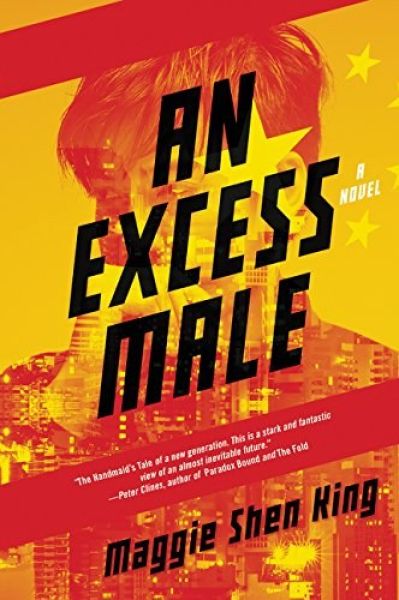It Looks Like Rain
An Excess Male
By Maggie Shen King

25 Jan, 2019
Maggie Shen King’s 2017’s An Excess Male is a standalone near-future SF novel.
Lee Wei-guo is one of forty million men who make up China’s so-called Bounty, the number of men in excess of the number of women. It’s a legacy of China’s one child policy that has been complicated by misogynistic choices to favor male children and abort or abandon females. Managing the Bounty is a pressing public policy challenge. Responses have included legalizing polyandry and assigning sex workers to the superfluous men.
Wei-guo is forty; his chances of finding a bride are waning. But there’s a glimmer of hope. He has enough money saved for a dowry1; he and his fathers can afford to pay a matchmaker for a few lunch meetings with prospective brides. One such has agreed to meet with Wei-guo and his fathers.
Wu May-ling is already married, to brothers Hann and Xiong-xin. Still, both husbands are much older than Wei-guo. Young and pretty May-ling will no doubt find him a welcome change from her difficult older husbands. The dowry will let them all move to a larger apartment.
It would seem like an easy decision … but there are complications. It’s clear, for example, that detached, poorly socialized Xiong-xin is a lost boy (he’s on the autism spectrum). In the China of this (unspecified) period, autistic people can be institutionalized and neutered. Xiong-xin has escaped this fate so far, thanks to his parents (who paid hefty bribes to the right officials), but his freedom could vanish with a rumour.
May-Ling’s other husband, Hann, is a willfully sterile, a homosexual. One might think that a nation with forty million extra men would welcome the existence of gay men; they wouldn’t take women out of the pool of eligibles. Not so. If Hann is ever exposed, he would be imprisoned and re-educated. Anyone who had shielded him would be fined and re-educated. As far as the State is concerned, anyone married to a willfully sterile probably concealed his deviance.
Even Wei-guo has issues. He is a player in the Strategic Games, outdoor wargame LARPs that are viewed with increasing suspicion by the Chinese military. Even though the games are monitored by the army, some officials believe that larpers could still pose a threat to the public and the state. It’s estimated that 4.9% of the general population are mentally ill. The same percentage of larpers must be nuts. Games officials are charged with giving the state a list of the 4.9%, who will then be seized and treated. That’s unlikely to be effective or kind.
It’s evident to everyone that this is stupid bureaucratic nonsense, mere security theater that will show that the government is doing something about recent outbreaks of violence. Wei-guo and his friends have resisted the decree, which threatens the officials in charge of the cull.
All communications are potentially bugged, all relationships monitored and unsatisfactory ones flagged. Keeping below the radar is necessary for anyone who is in any way unconventional; it’s also close to impossible. None of the central characters in this novel are good at stealth. There will be consequences.
~oOo~
I am not sure exactly when this book is set. I’ve seen reviews that claim that the date is 2030, but that comes from the Reading Group Discussion Guide in the back of the book. Nowhere in the text is a year provided. Also, 2030 seems a bit too soon for the massive social and political changes the author has imagined. Frex: Wei-guo’s widowed dads are in their eighties. Wei-guo is in his forties. If the year is 2030, then the marriage that produced Wei-guo would have had to take place sometime in the1990s, which seems unlikely. Pick a year when polyandry might be official policy, and add forty to it.
It may seem that various government policies are working at cross purposes. For example:
To eradicate counterrevolutionary thought and challenges from its excess of dissatisfied men, their government has lumped homosexuality with mental illness and genetic diseases and classified everything heritable. It requires same-sex lovers to register their sexual orientation and undergo vasectomies. It is criminal for them to marry, reproduce, or raise children.
It seems to me that real world public policies are all too often intended to demonstrate the power of the state to inflict pain and suffering. Or should I say, magnify the power of the functionaries who inflict the pain and suffering. Such policies also keep the masses insecure, afraid, and obedient. So, no, I don’t find it hard to believe that the government in this novel is pointlessly cruel.
Readers might expect that this book would end in a triumphant uprising in which the little people force their masters to listen to their concerns. The author gives the characters no such hope, no eucatastrophe. She simply tells the story of three people, each with their own strengths and weaknesses, trying to survive in a setting in which deviation is harshly punished and where endless vigilance cannot keep one safe. Long on dramatic tension, short on happy endings.
If you need a happy ending, this is not the book for you. If you like interesting characters and a well-crafted narrative pace, this may hit the spot.
An Excess Male is available here (Amazon) and here (Chapters-Indigo).
1: Dowry is a term ordinarily used for the money or goods a bride’s family gives to the groom’s family. Brideprice is used for the payment that a groom’s family gives for the bride. It is not clear why the term dowry is used in this book.
